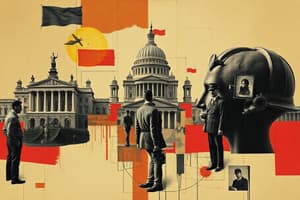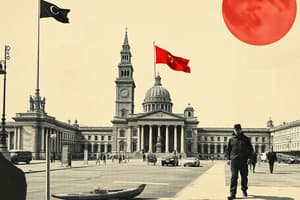Podcast
Questions and Answers
What is politics?
What is politics?
The art of government, public affairs, compromise and consensus, power, and international relations.
Which of these concepts describe politics? (Select all that apply)
Which of these concepts describe politics? (Select all that apply)
- Manipulation and deceit (correct)
- Conflict (correct)
- Compromise and consensus (correct)
- Only governance
Politics is purely about resolving conflicts.
Politics is purely about resolving conflicts.
False (B)
What does Aristotle refer to as the purpose of politics?
What does Aristotle refer to as the purpose of politics?
What is the traditional view of politics associated with?
What is the traditional view of politics associated with?
What distinguishes authority from power?
What distinguishes authority from power?
Which of the following types of authority did Max Weber distinguish?
Which of the following types of authority did Max Weber distinguish?
Politics is often portrayed as a process of __________ resolution.
Politics is often portrayed as a process of __________ resolution.
Flashcards are hidden until you start studying
Study Notes
Politics: Understanding the Concept
- Politics is a multifaceted term, often viewed negatively, encompassing conflict, deceit, and power dynamics.
- It is the process of making, maintaining, and modifying societal rules, involving both conflict and cooperation.
- Different perspectives on politics exist: exercise of power, science of government, collective decision-making, allocation of resources, and manipulation.
Politics as the Art of Government
- Politics is closely tied to governance, encompassing the control and management of a society.
- The concept originates from the ancient Greek "polis," referring to city-states with their own systems of governance.
- "What concerns the state" is a traditional view, emphasizing the role and mechanics of government in politics.
Authority: Legitimate Power
- Authority is "legitimate power," meaning the right to influence others based on a duty to obey.
- Distinct from mere power, authority relies on acceptance and legitimacy, not coercion.
- Max Weber identified three types of authority: traditional (based on history), charismatic (stemming from personality), and legal-rational (grounded in rules).
Politics: A Restricted View
- This perspective sees politics confined to the actions within a structured political system ("polity"), centered around government institutions.
- This view limits politics to activities in specific locations, such as cabinet rooms, legislative chambers, and government departments.
- It focuses on a limited set of actors, primarily government officials, rather than a broader range of political engagement.
Studying That Suits You
Use AI to generate personalized quizzes and flashcards to suit your learning preferences.




